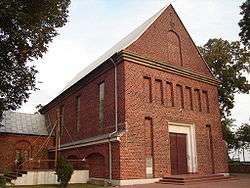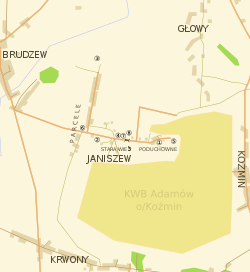Janiszew, Greater Poland Voivodeship
Janiszew [jaˈniʂɛf] is located in the centre of Brudzew administrative district of Poland, near the Koźmin strip of Adamów Brown Coal Mine, on a small river called Struga Janiszewska. The village lies on local road from Brudzew to Koźmin, about 10 kilometers from Turek, and 2 kilometers from Brudzew. Janiszew consists of the so-called Parcele, Poduchowne, Ostrów, and Stara Wieś of which only a giant hole of the strip mine remains today. The village adjoins Brudzew, Krwony, Głowy and Koźmin and is located about 100–105 meters above sea level.[1]
Janiszew | |
|---|---|
Village | |
 Church in Janiszew | |
 | |
 Janiszew | |
| Coordinates: 52°05′N 18°39′E | |
| Country | Poland |
| Voivodeship | Greater Poland |
| Powiat | Turek County |
| Gmina | Brudzew |
| Established | 15th century |
| Government | |
| • Mayor (sołtys) | Zdzisław Kaźmierczak |
| Area | 7.17 km2 (2.77 sq mi) |
| Population (2006) | 285 |
| • Density | 40/km2 (100/sq mi) |
| Time zone | UTC+1 (CET) |
| • Summer (DST) | UTC+2 (CEST) |
| Postal code | 62-720 |
| Area code(s) | +48 63 |
| Car Plates | PTU |
| Website | www.janiszew.net |
At present Janiszew has a population of 286 people, inhabiting 56 farms. In 2005 five new inhabitants were born (four boys and one girl), and three people died (two women and one man), while in the previous year one child was born and four people died. The average population density is 40 people per square kilometer.[1]
The village of Janiszew has an area of 7.17 km². Cropland covers 6.15 km², of which 4.47 km² are arable. The remaining 1.68 km² is grassland and pastures. Areas covered by forests, ditches and roads total 0.12 km², while building areas amount to 0.10 km², and wasteland covers 0.11 km².[1]
The village administrator (chair of village council) is Zdzisław Kaźmierczak, and the village council comprises also of Edward Oblizajek and Marek Włodarczyk. Among former administrators were: Marian Szymaniak, Stanisław Warach, Leonard Granos, Kazimierz Kubiak and Kazimierz Kubiak.[1]
Church
That church was pulled down and disassembled by the Nazi during the Second World War (1939-1945). After the war, there was a wooden makeshift church, and fifteen years after the war had ended, in the years 1958-1960 a new brick temple was erected, according to a project by civil engineer Wielichowski.[2]
| Wikimedia Commons has media related to Janiszew. |
